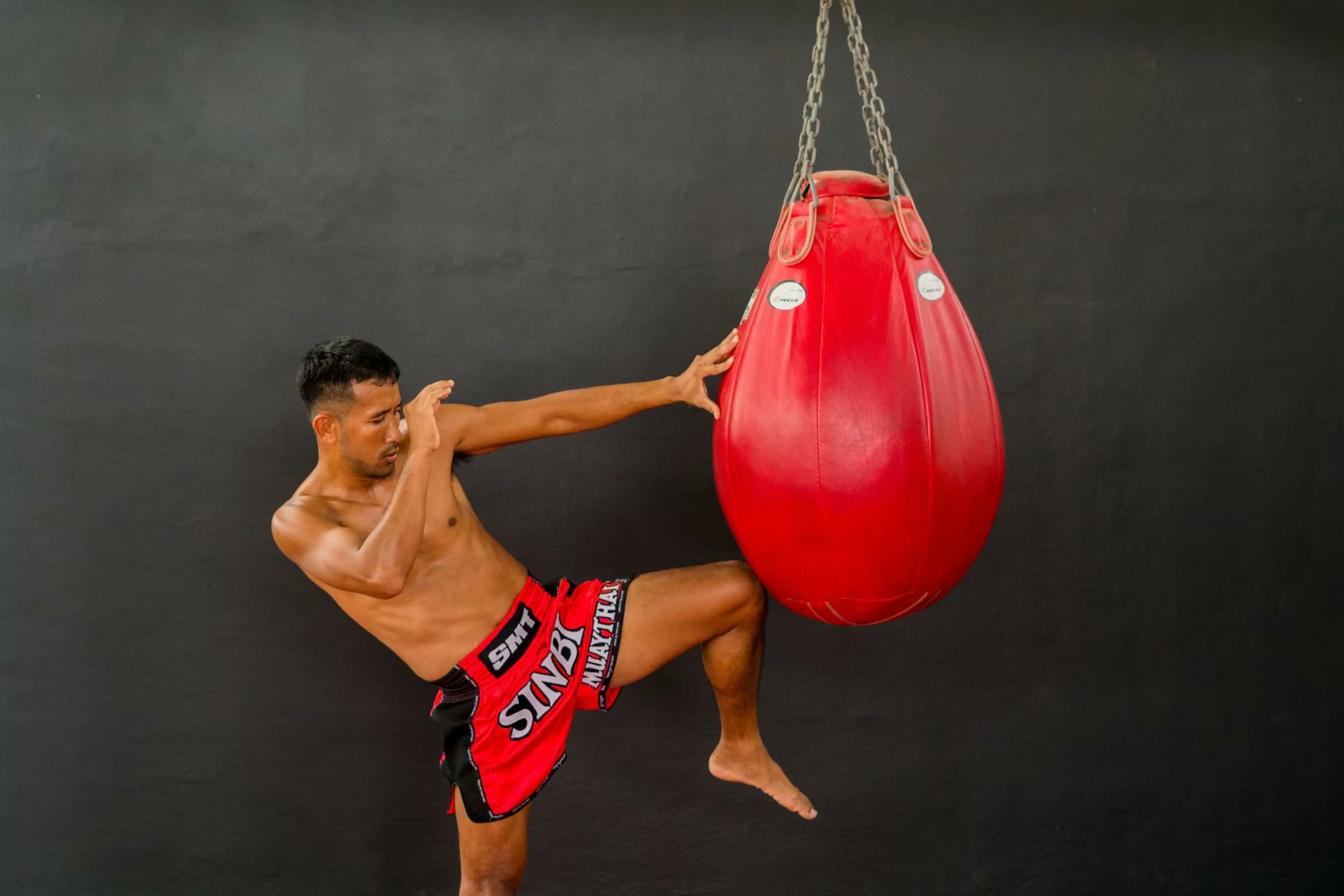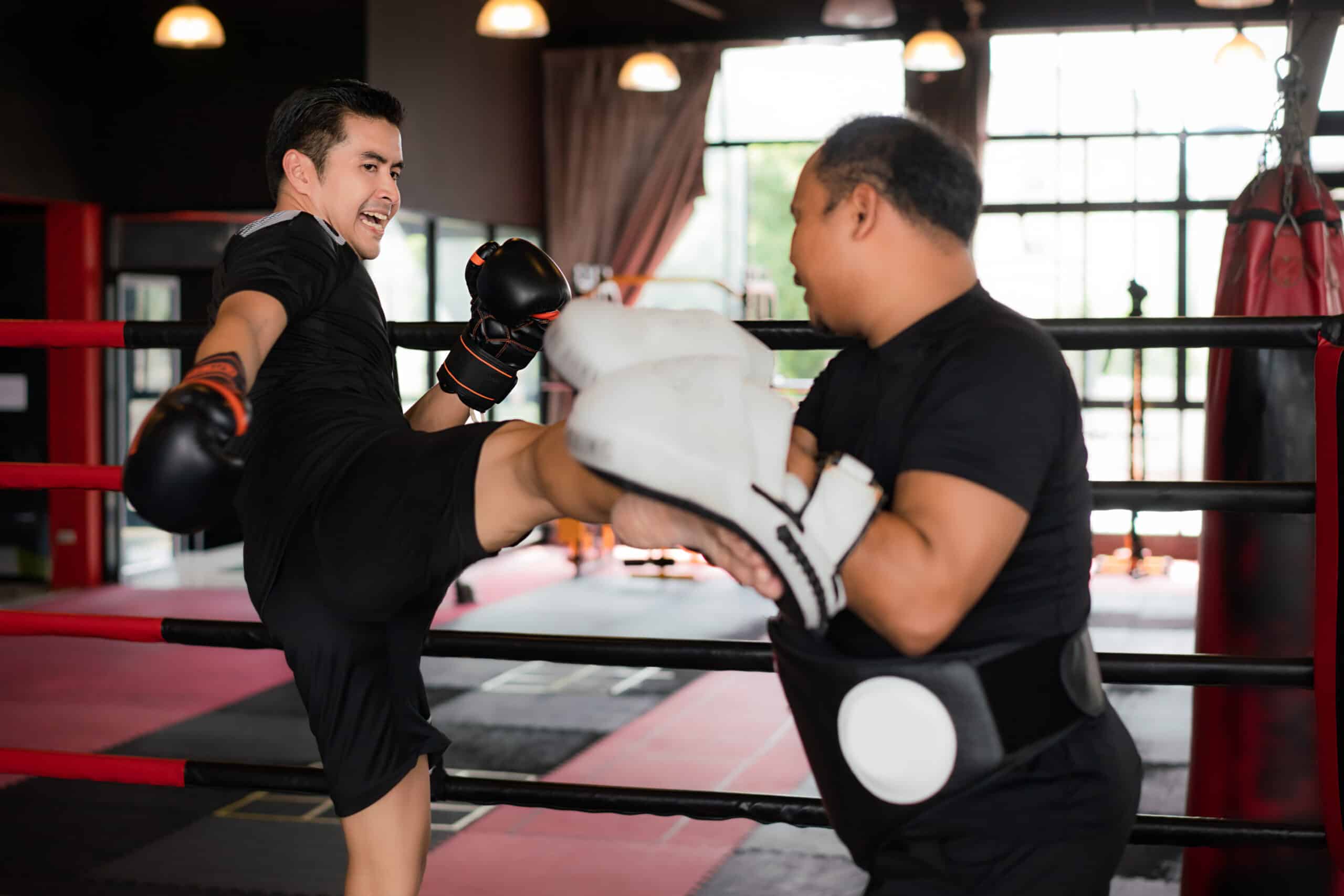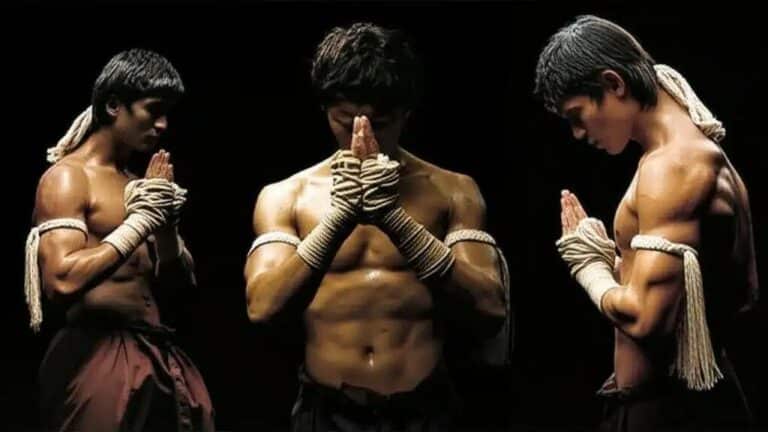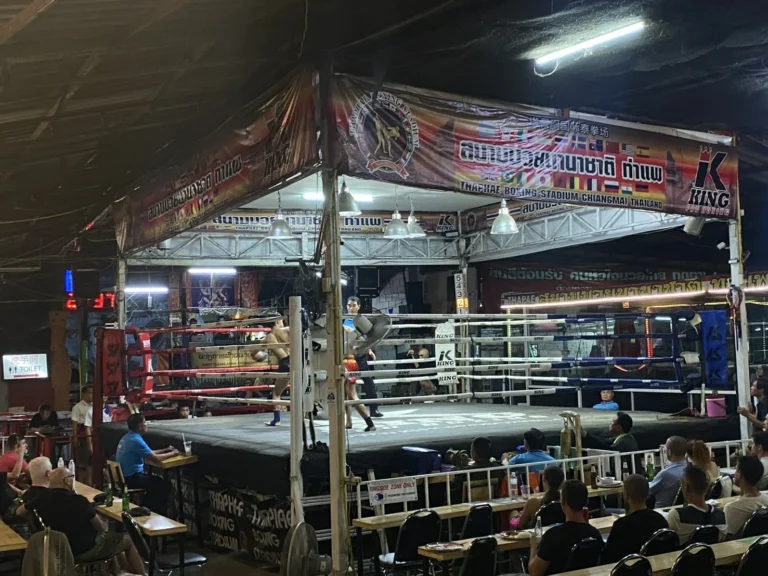Ready to start learning the “Art of Eight Limbs“? Muay Thai is more than just a combat sport; it’s a discipline that builds physical power, mental strength, and focus. If you’re curious about different martial arts, understanding the fundamentals of basic Muay Thai training is your essential first step. This guide will walk you through what Muay Thai training involves, the great benefits it offers, the core techniques you’ll learn, and how to start your own training journey effectively.
Whether you’re looking to get fit, learn self-defense, or step into the ring, this article provides a complete Muay Thai training guide, offering helpful tips and lessons to help you succeed. Let’s learn about Thai Boxing training.

Your Guide to Muay Thai Training Basics
What exactly is basic Muay Thai training? It’s a strong system developed in Thailand, focusing on using fists, elbows, knees, and shins. Different from some martial arts, Muay Thai puts stress on powerful, direct strikes and clinch fighting.
What is Muay Thai Training?
Simply put, what is Muay Thai training? It’s a full-body workout and fighting system that mixes striking techniques with tough physical exercise. A normal Muay Thai lesson for beginners includes warm-ups, technique teaching, partner drills, bag work, and cool-downs. It’s tough but really pays off.
Benefits of Training Muay Thai
Training Muay Thai offers a multitude of benefits. Physically, it significantly improves heart health, strength, flexibility, and how well your body works together. Mentally, it builds control, focus, confidence, and helps with stress. Doing martial arts Muay Thai training is a total practice that makes your body and mind stronger.
What to Expect as a Beginner
As a beginner, you can expect your first Muay Thai lessons to focus a lot on the basics. You’ll spend time learning the right stance, simple moves, and the correct way to do simple strikes. Don’t get down because it’s hard; everyone starts somewhere, and doing it regularly is important. You’ll probably feel sore, but that shows your body is getting used to it.
Basic Muay Thai Stance and Movement
The base of all training for Muay Thai is the stance. A good Muay Thai stance is balanced, letting you throw powerful strikes and defend fast. You’ll learn to keep your guard up, put your weight in the right spot, and move well – shuffling, turning, and keeping distance. Getting good at basic footwork matters a lot before you try harder moves.

Learning Core Muay Thai Techniques
Once you know the basics, your basic Muay Thai training will move to learning the main attack and defense moves. This is where you learn to use the “eight limbs.”
Essential Strikes (Punches, Elbows)
Muay Thai uses punches from Western Boxing (jabs, crosses, hooks, uppercuts) but often with a more straight-up stance than standard boxing. Elbow strikes are strong weapons up close, used at different angles (straight out, up and down, curving up). Doing the technique correctly is key for power and staying safe.
Kicks (Low, Mid, High)
The roundhouse kick is maybe the most well-known Muay Thai move. Done with the shin, it hits the legs (low kick), body (mid kick), or head (high kick). Learning to get power from turning your hip is important. You’ll also learn push kicks (teep) used to defend, attack, and make space.
Knees
Knee strikes are powerful tools, especially when holding someone. You’ll learn straight knees (going forward), angled knees, and curved knees. Good knee strikes need good balance and often using your arms to pull an opponent closer.

Basic Defense and Blocking
Defense is just as important as attacking in Muay Thai training. You’ll learn how to block kicks with your shin (checking), guard against punches with your arms, avoid strikes, and stop moves. Moving your head, while not as much as in boxing, is also part of defending.
Introduction to the Clinch
The clinch (pak) is a special part of Thai Boxing training. It involves standing grappling moves to control an opponent, hit them with knees and elbows, and get ready to throw or sweep them. Basic clinch practice involves learning how to hold, stand, and do basic knee attacks.
How to Train Muay Thai Effectively
Knowing the moves is one thing; doing them well takes steady and different training Muay Thai ways. Your gym time will mix different types of practice to build skill, power, and timing. For a more immersive experience, consider attending a Muay Thai training camp.
Shadow Boxing Practice
Shadow boxing means practicing moves in the air, often picturing an opponent. It’s key for getting good form, smooth flow, balance, and rhythm. It’s a main part of any Muay Thai training guide.
Pad Work and Bag Work
Hitting pads held by a trainer or partner is like hitting a moving target and helps build power, speed, and combinations. Hitting a bag (heavy bag, speed bag) builds power, toughness, and lets you practice moves by yourself. Both are necessary for real basic Muay Thai training.

Sparring Fundamentals
Sparring lets you practice moves against someone who is fighting back in a safe setting. Beginners usually start with light, technical sparring focused on using basic moves and defense without hitting too hard. It’s a safe way to learn how to train for Muay Thai in a practice fight.
Clinch Drills
Certain practices are set up just for learning how to get into the clinch, hold someone, hit knees from the clinch, and stand in a defensive way. This helps fighters feel comfortable and effective when they are close to an opponent.
Warm-up and Cool-down
Every Muay Thai lesson starts with a full warm-up to get the body ready and ends with a cool-down and stretching to help the body get better and stay flexible. Skipping rope is a common warm-up, building cardio and footwork.
Conditioning and Fitness for Muay Thai
Training Muay Thai needs you to be in good shape. Besides just learning moves, you need the physical ability to do them well and keep going through rounds.
Building Stamina and Cardio
Endurance is most important. Running, skipping rope, circuit training, and constant practice are all used to build the necessary heart fitness for training Thai Boxing. Long training sessions make your body better at using oxygen over time and during short, hard bursts.
Strength Training Exercises
Strength in Muay Thai is not just about lifting weights. It’s about useful strength, quick power, and a strong middle body. Bodyweight exercises, resistance bands, and certain weight training (like squats, deadlifts, push-ups, pull-ups) can make your strikes stronger and improve clinch strength. Building a strong core is key for getting power in every strike.
Flexibility and Mobility
Being flexible, especially in your hips and shoulders, is key for powerful kicks and elbows and avoiding getting hurt. Mobility exercises make sure your joints can move fully, which is vital for moves like high kicks and effective clinching.

Injury Prevention and Recovery
Taking care of your body is very important when training Muay Thai. Doing warm-ups right, cooling down, stretching, listening to your body, getting enough rest, and eating well are key to stopping injuries. Things like foam rolling and massage can also help you get better.
Finding Muay Thai Training and Lessons
Ready to start your Muay Thai lesson journey? Finding the right spot to train is vital for a good and useful experience.
How to Find a Good Muay Thai Gym
Look for gyms with experienced teachers, a safe and clean place, and a group that supports you. Reading online reviews, visiting gyms you are thinking about, and talking to students there can give you a good idea of what it’s like and how good the teaching is. Consider a gym that offers specific Muay Thai classes for beginners.
What to Look for in a Trainer
A good trainer knows a lot, is patient, and cares about proper technique and safety. They should be able to explain things clearly and give you specific feedback. Many skilled trainers have spent time training for Muay Thai in Thailand themselves.
Essential Gear You Need
For basic Muay Thai training, you’ll need some main pieces of essential gear you need:
- Hand wraps (keep your wrists and knuckles safe)
- Boxing gloves (14oz or 16oz are normal for training)
- Shin guards (for sparring)
- Mouthguard (needed for sparring)
- Optional: Headgear (for sparring), groin protector, training clothes
Attending Your First Class
Most gyms offer a free first class. Wear comfy workout clothes that let you move easily. Get there early to say hello and ask questions. Get ready to sweat! Focus on listening to your teacher and learning the simple moves. Don’t worry about being perfect; the goal is to learn and like doing it.

Frequently Asked Questions
What is Muay Thai training like?
Muay Thai training is hard work and uses your whole body. It includes warm-ups (like skipping rope), practicing moves (stances, strikes, defense), working with a partner, hitting the bag, doing exercises to get in shape, and cooling down. It’s tough but builds lots of physical and mental strength.
How long does it take to learn basic Muay Thai?
You can learn the basic Muay Thai training fundamentals in a few weeks or months if you train regularly. But getting really good at the moves takes years of hard work and steady training Muay Thai.
Is Muay Thai good for beginners?
Yes, Muay Thai is great for beginners. Most gyms have classes just for people with no past experience. These classes focus on being safe, learning basic moves, and getting in shape before trying harder things or sparring.
What are the “eight limbs” of Muay Thai?
The “eight limbs” mean the eight body parts used to hit in Muay Thai: two fists, two elbows, two knees, and two shins. This shows all the ways you can strike in this art.
Do I have to fight if I train Muay Thai?
No, most people train Muay Thai for fitness, self-defense, discipline, and to be part of a group. Fighting in matches is something you can choose to do and needs special advanced training for Muay Thai.
What should I wear to my first Muay Thai lesson?
Wear comfortable exercise clothes that let you move around easily, like shorts or leggings and a t-shirt or tank top. You will train without shoes on the mats.
How often should I train Muay Thai?
For beginners, training 2-3 times a week is often suggested to build a habit and learn the basics without working out too much. As you get better, you might train more often based on your goals.
Conclusion
Basic Muay Thai training offers a fantastic way to get physically fit, become mentally strong, and learn an effective martial art. From learning the stance and main strikes to getting in the needed shape, each Muay Thai lesson helps you get closer to being a skilled student.Starting the journey of training Muay Thai is hard but very rewarding. Don’t be scared to find a good gym, step onto the mats, and feel the strength of the “Art of Eight Limbs” yourself. Start your Muay Thai training journey today!
Read more:




